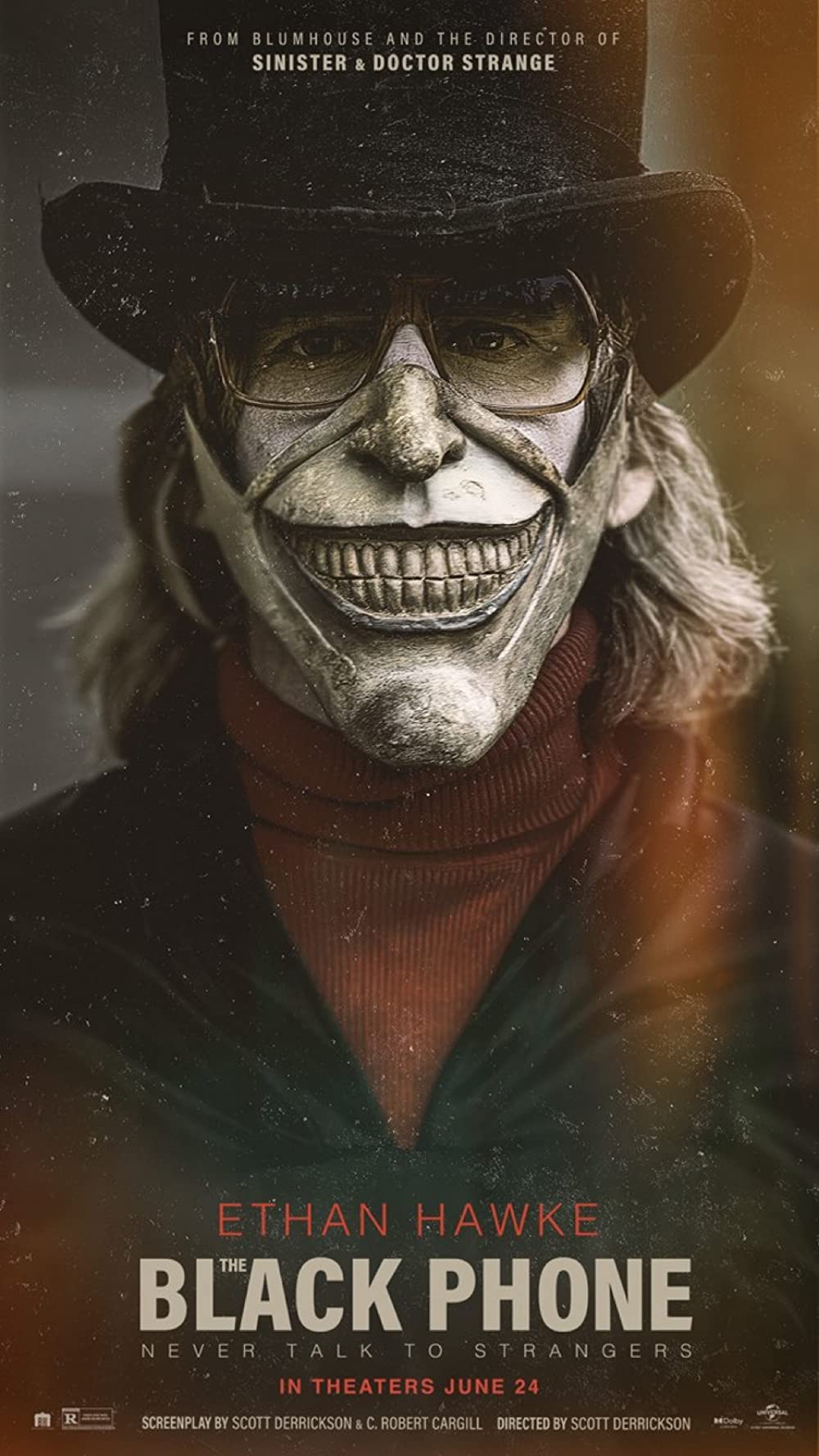
08 Jul The Black Phone Review
THE BLACK PHONE
dir. Scott Derrickson, starring Mason Thames, Madeline McGraw, Ethan Hawke and Jeremey Davies
“Scream and I will gut you and strangle you with your own intestines.”
That’s the vibe of The Black Phone, the latest supernatural horror movie co-written and directed by Scott Derrickson. As a small town is held under the terror of a rash of child kidnappings, Finney Shaw, a shy but clever young man with dreams of NASA and space shuttles, becomes the latest victim by The Grabber, the moniker given to the man conducting these snatchings. Held in a soundproofed basement far from the assistance of police, Finney is helped by a mysterious connection between him and an unplugged phone that resides on the wall of the basement. On the phone are previous children who The Grabber has killed and, as time runs out for Finney, their collective previous attempts at escape aid him in his efforts to free himself before The Grabber decides Finney’s time is up.
Starring Mason Thames as Finney, props must be given to the casting department. Thames is believable as the kidnapped student, able to play vulnerable as he’s whaled on by fellow high school classmates, as well as brave and capable when the time comes for it. There’s a strong hint of steel within Finney from his first moments locked in the basement: he questions The Grabber, susses out information the kidnapper accidentally let’s slip, and is proactive in working towards his escape. Throughout all this, Thames gives a solid performance that carries the film well. In comparison, Madeline McGraw as his younger sister Gwen is equally as dependable, with Gwen delivering a feisty performance that promises much more from McGraw to come. As the supernatural element of the film, Gwen’s dreams (possibly with some help from big Jesus upstairs) guide her in helping the police to track down her older brother. With easily the best line in the movie, which I won’t spoil here, McGraw is the story’s heart, as her love for her brother, as well their necessity to stick together to protect each other from their abusive alcoholic father, is her main driving force.
Ethan Hawke is served the hardest role in the movie, having to spend almost every second of the movie acting behind a mask. Having to emote almost entirely through the eyeholes, Hawke somehow still manages to turn in a good performance as the movie’s villain. While little story is provided for The Grabber, other than being a child kidnapper who psychologically tortures and eventually murders his victims, Hawke’s presence is more felt than seen on screen. Physically imposing, when compared to Mason Thames, Hawke oscillates between jovial jail mate and something far more sinister as The Grabber conducts his mind games with Finney. The second of two antagonists Hawke has played this year (the other being Arthur Harrow in the Disney+ show Moon Knight), Hawke’s performance here in The Black Phone, even masked, is far superior.
In January of 2020, it was announced by Marvel Studios that Scott Derrickson would no longer be directing Doctor Strange in the Multiverse of Madness, citing the time-honored excuse of creative differences. Though he stayed on as executive producer, this decision freed up Derrickson to collaborate with screenwriter C. Robert Cargill, adapting the screenplay from Joe Hill’s eponymously titled short story. While hamstrung by the execs at Disney to fit the mold of MCU films, here in The Black Phone, Derrickson is untethered, giving audiences a smartly directed supernatural horror with no qualms or preconceived boxes to check. Derrickson is the real winner of the film, going out of his way to develop the necessary unsettling mood of the film by collaborating with cinematographer Brett Jutkiewicz to force the audience’s eye where they want it. While jump scares have long become cliche in the horror genre, the forcing of the audience’s eye lends to a pair of excellent jump scares that genuinely surprise and shock. The minimalistic set design also goes a long way in carrying the film; an austere soundproofed concrete room with nothing but a bed, a phone, and a bathroom makes for a large portion of the second and third act, creating a sense of hopelessness that surrounds Finney.
Overall, The Black Phone is a well crafted horror movie that will go a long way to satisfying horror fans until the inevitable fall deluge. Excellently filmed by Scott Derrickson, with both young leads delivering good performances, the film’s unsettling tone and spartan design give it a low budget feel that comes across as authentically made by people who respect the genre. At 103 minutes, the pacing stumbles a bit in the second act, but that misstep goes a long way into setting up for the final confrontation between Finney and The Grabber. The Black Phone is currently in theaters.
Review by Darryl Mansel


No Comments